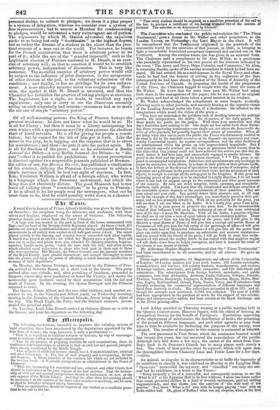Of all well-meaning persons the King of Prussia betrays the
greatest weakness: he does not know what he would be at. He Is all for liberty ; but then it must be a liberty anticipating his own wishes with a spontaneous servility that outruns the obedient start of hired servants. He is all for giving his people a consti- tution; but he cannot for the life of him get it forth. Like the miser in the play, he is lugging out the sixpence that is to attest his munificence ; and then—he puts it into his pocket again. He is all for freedom of the press ; and so he establishes a Berlin Journal des Debats—a very Berlin Journal des Debats—to " dis- cuss "—that is to publish his prohibitions. A recent proscription is directed against two respectable journals published at Bremen : the editor of one, the Bremen. Gazette, has published a vindication of his conduct, defying the Prussian Government to adduce a single instance in which he had lost sight of decorum. In fact, King Frederick William is afraid of a foreign editor, who writes in a language which the Prussians understand, but which the King does not absolutely dictate. The good Monarch had better leave off talking about " constitutions " to be given to Prussia : if he is afraid to let his people read the newspapers, what can he trust them to do, that he could possibly write down in a charter ?


























 Previous page
Previous page